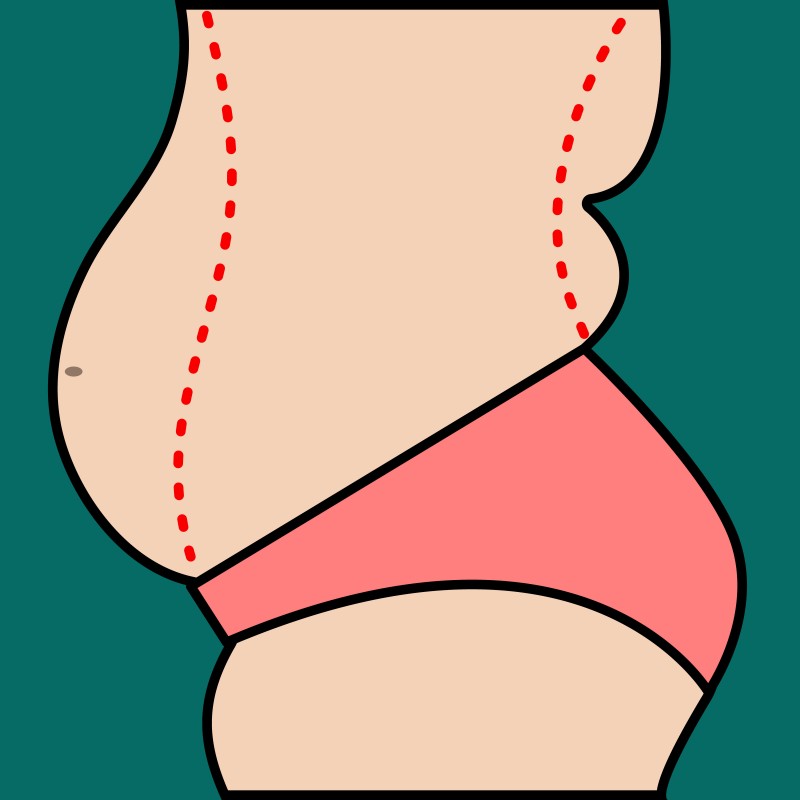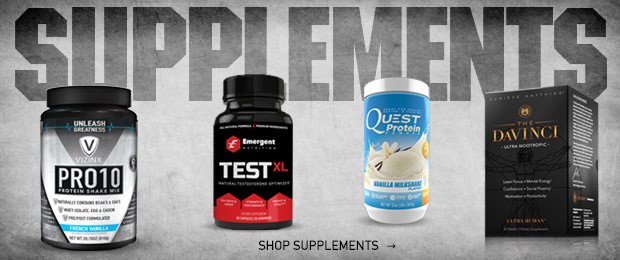
Fat is stubborn. You can be doing everything right — diet, exercise, and recovery — and still not see the scale budge. Moreover, that situation can be extremely frustrating. I know many people, including myself, who have been there before, which is why I want to tell you about a sneaky culprit preventing weight loss known as your blood sugar. When your body has a hard time regulating blood sugar levels, it can be damn near impossible to drop body fat. Let me explain why.
When you eat, your pancreas produces a hormone called insulin. Insulin gets released into circulation, where it then knocks on the doors of cells, like muscle, telling them it’s time to take sugar out of the bloodstream and use it for fuel. It can also tell fat cells it’s time to take in glucose and store it. In excess, insulin can also block the release of fat from fat stores.
RECENT: The Influence of Supernormal Stimuli on the Evolution of Bodybuilding
People who are regularly eating and not using that energy can develop insulin resistance. As they overload their bodies with insulin, the receptors that respond to insulin become desensitized. It’s a horrible cycle where your pancreas keeps telling your body to make more insulin, but your cells that should respond to it don’t. Insulin then starts acting more like a hormone that signals your fat cells to store glucose in the blood as fat rather than a hormone that’s telling active organs like muscles to use it as fuel. If you are storing sugars and blocking the breakdown of fat, weight gain becomes inevitable.
Usually, people who have become insulin resistant are told to exercise because the glucose transporters in muscle that respond to insulin can also act independently of insulin and clear blood sugar levels through exercise-induced translocation to the cell surface. However, what about the people who are already exercising and eating right but still struggle with a blood sugar issue?
I’m here to tell those people who do everything right and still struggle that there are some pretty potent supplements out there that work to improve insulin sensitivity. I’ve tried most of them myself and can say that they are POTENT. Let’s get into it.

tomozina © 123rf.com
Supplements That Fight Insulin Insensitivity
- Resveratrol (50-500mg/day, up to 3g/day): Resveratrol is a natural polyphenol that can protect against inflammation and insulin resistance1-4. In fact, it has been shown to reduce blood insulin and glucose levels. Resveratrol functions to improve insulin sensitivity by increasing glucose uptake. More specifically, it improves activation of the insulin, signaling pathway and the translocation glucose transporters to the cell membrane4. It does this by enhancing the action of a protein known as SIRT1 and the energy sensor AMPK (Adenosine 5’Monophosphate-activated Protein Kinase)4, which function together to activate the metabolic regular of glucose metabolism PGC1a. To add resveratrol to your daily routine, you could try taking 500mg in the morning and evening.
- Berberine (100mg/meal): Berberine5-7 is a chemical found in plants that improves the expression of insulin receptor and glucose transporters in the brain6. Berberine also increases glucose utilization in fat and muscle cells while also decreasing glucose absorption in intestinal cells. More specifically, one month of berberine supplementation can reduce fasting blood glucose levels, postprandial blood glucose levels, insulin resistance index, and inflammatory cytokine (TNFa, CRP, IL-6) levels5. Hence, berberine reduces the inflammatory cytokines that give rise to impaired insulin signaling and results in lower blood glucose levels and increased insulin sensitivity. If you want to add berberine to your supplement regime, consider starting off with 100mg before meals.
- Citrus Bergamot (500mg in the morning and evening): A derivative of lemon and bitter orange, this citrus extract has been shown to both reduce stress and insulin resistance. It’s also been shown to improve glucose metabolism and insulin sensitivity and reduce blood glucose up to 22 percent8, through the activation of AMPK9. This is no small feat, as AMPK is the body’s energy sensor and regulator. If you want to add Citrus Bergamot to your daily routine, you could try taking 500mg in the morning and evening10-12.
- Chromium Picolinate (500-1,000mg fasted in the morning): Chromium Picolinate is a chromium derivative that is effective in regulating blood sugar. In the 1950s, it was discovered that chromium supplementation could reverse glucose-intolerance13-15 and enhance insulin action16, 17. Chromium has been tested in many models of impaired insulin signaling (diabetes, hyperglycemia, hyperinsulinemia, etc.), and each time, it has been shown to improve impaired insulin signaling16. Other work has demonstrated that the effects of chromium on glucose tolerance are due to its direct effect on insulin signaling and glucose metabolism. Chromium can augment insulin-mediated glucose metabolism in adipocytes and can cause a three- to eight-fold increase in insulin-dependent stimulation of the insulin receptor without impairing its basal activity18. Additionally, chromium increases insulin-dependent transport of the glucose receptor Glut4 to the cell membrane under insulin-resistant conditions19, 20. Hence, chromium is a potent and proven enhancer of glucose metabolism in those who are insulin-resistant. If you want to add chromium picolinate to your daily routine, you could try taking 500-1,000mg fasted in the morning.
RELATED: Refueling and Recovery for BAMF Wrestlers
Summing It Up
Personally, I take Citrus Bergamot and Chromium Picolinate first thing in the morning, and then Berberine with dinner. I’ve also seen Citrus Bergamot reduce the fasting blood glucose levels (I’m talking going from over 100mg/dl to under 90mg/dl) in my significant other in a matter of days. And despite it just being my two cents, I believe (and the science supports) that these supplements work. I know it can be frustrating to seemingly be doing everything right and not seeing results when it comes to shedding body fat. If you are insulin-resistant, consider adding one or two of these supplements to your routine for a month or two and document how it goes.
Abbreviations
- SIRT1 — Sirtuin 1
- PGC1a — Peroxisome Proliferator-Activated Receptor Gamma Coactivator 1 Alpha
- TNFa — Tumor necrosis factor
- CRP — C-reactive protein
- IL-6 — Interleukin 6
Note: I’m not a medical doctor, and none of the above is medical or nutritional advice and/or recommendations, but rather just some of my thoughts and comments based on personal experience and the literature. Taking any of my thoughts as a recommendation for changes in diet, including the use of supplements, is entirely your responsibility, and you should consult a physician prior to undergoing any dietary or food supplement change. Never disregard professional medical advice or delay in seeking it because of something you have read. The content of this article is for informational and educational purposes only and any use is solely at your own risk.
References
- Zhu, X., Wu, C., Qiu, S., Yuan, X. & Li, L. Effects of resveratrol on glucose control and insulin sensitivity in subjects with type 2 diabetes: systematic review and meta-analysis. Nutrition & metabolism 14, 60 (2017).
- Zare Javid, A. et al. The Impact of Resveratrol Supplementation on Blood Glucose, Insulin, Insulin Resistance, Triglyceride, and Periodontal Markers in Type 2 Diabetic Patients with Chronic Periodontitis. Phytotherapy research : PTR 31, 108-114 (2017).
- Wong, R.H.X. & Howe, P.R.C. Resveratrol Counteracts Insulin Resistance-Potential Role of the Circulation. Nutrients 10 (2018).
- Chen, S. et al. Resveratrol improves glucose uptake in insulin-resistant adipocytes via Sirt1. The Journal of nutritional biochemistry 55, 209-218 (2018).
- Cao, C. & Su, M. Effects of berberine on glucose-lipid metabolism, inflammatory factors and insulin resistance in patients with metabolic syndrome. Experimental and therapeutic medicine 17, 3009-3014 (2019).
- M, S.S. & C, D.N. Influence of quercetin, naringenin and berberine on glucose transporters and insulin signalling molecules in brain of streptozotocin-induced diabetic rats. Biomedicine & pharmacotherapy = Biomedecine & pharmacotherapie 94, 605-611 (2017).
- Pirillo, A. & Catapano, A.L. Berberine, a plant alkaloid with lipid- and glucose-lowering properties: From in vitro evidence to clinical studies. Atherosclerosis 243, 449-461 (2015).
- Mollace, V. et al. Hypolipemic and hypoglycaemic activity of bergamot polyphenols: from animal models to human studies. Fitoterapia 82, 309-316 (2011).
- Jiang, S.J. et al. Berberine inhibits hepatic gluconeogenesis via the LKB1-AMPK-TORC2 signaling pathway in streptozotocin-induced diabetic rats. World journal of gastroenterology 21, 7777-7785 (2015).
- Alam, M.A. et al. Effect of citrus flavonoids, naringin and naringenin, on metabolic syndrome and their mechanisms of action. Advances in nutrition 5, 404-417 (2014).
- Cai, Y. et al. Effects of 12-week supplementation of Citrus bergamia extracts-based formulation CitriCholess on cholesterol and body weight in older adults with dyslipidemia: a randomized, double-blind, placebo-controlled trial. Lipids in health and disease 16, 251 (2017).
- Lv, X. et al. Citrus fruits as a treasure trove of active natural metabolites that potentially provide benefits for human health. Chemistry Central journal 9, 68 (2015).
- Freund, H., Atamian, S. & Fischer, J.E. Chromium deficiency during total parenteral nutrition. JAMA : the journal of the American Medical Association 241, 496-498 (1979).
- Jeejeebhoy, K.N., Chu, R.C., Marliss, E.B., Greenberg, G.R. & Bruce-Robertson, A. Chromium deficiency, glucose intolerance, and neuropathy reversed by chromium supplementation, in a patient receiving long-term total parenteral nutrition. The American journal of clinical nutrition 30, 531-538 (1977).
- Mertz, W. & Schwarz, K. Relation of glucose tolerance factor to impaired intravenous glucose tolerance of rats on stock diets. The American journal of physiology 196, 614-618 (1959).
- Hua, Y., Clark, S., Ren, J. & Sreejayan, N. Molecular mechanisms of chromium in alleviating insulin resistance. The Journal of nutritional biochemistry 23, 313-319 (2012).
- Wang, H., Kruszewski, A. & Brautigan, D.L. Cellular chromium enhances activation of insulin receptor kinase. Biochemistry 44, 8167-8175 (2005).
- Davis, C.M. & Vincent, J.B. Chromium oligopeptide activates insulin receptor tyrosine kinase activity. Biochemistry 36, 4382-4385 (1997).
- Cefalu, W.T., Wang, Z.Q., Zhang, X.H., Baldor, L.C. & Russell, J.C. Oral chromium picolinate improves carbohydrate and lipid metabolism and enhances skeletal muscle Glut-4 translocation in obese, hyperinsulinemic (JCR-LA corpulent) rats. The Journal of nutrition 132, 1107-1114 (2002).
- Chen, G. et al. Chromium activates glucose transporter 4 trafficking and enhances insulin-stimulated glucose transport in 3T3-L1 adipocytes via a cholesterol-dependent mechanism. Molecular endocrinology 20, 857-870 (2006).











4 Comments